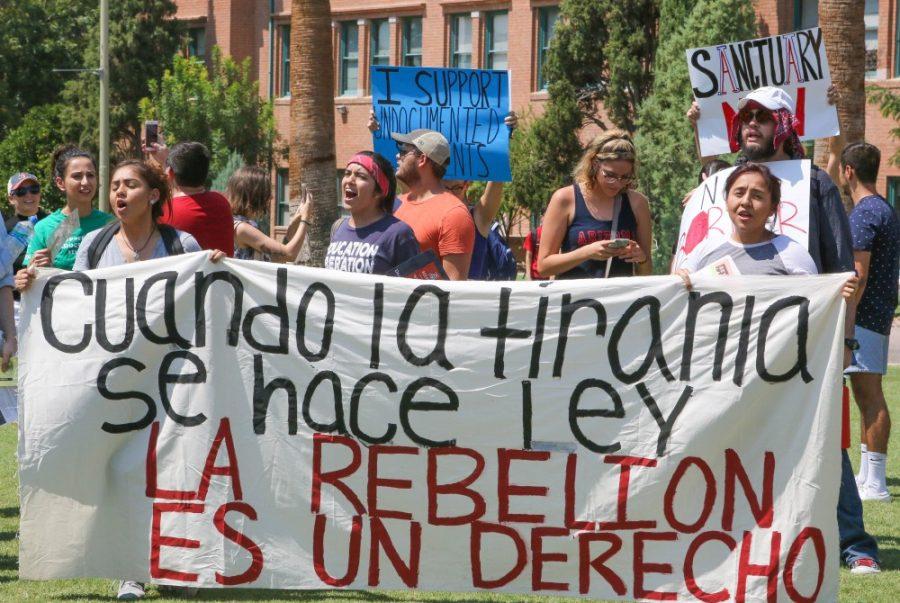The recent end to the Deferred Action for Childhood Arrivals program brought to light another threat to undocumented students: scammers.
Uncertain about their future in the U.S., immigrants often seek help from people who promise what seems like manna from heaven: green cards, work visas, even citizenship. But what follows is more of a bombshell.
“This is a huge issue,” wrote Rachel Wilson, a Tucson immigration lawyer, in an email. “People come to see me all the time having been to notarios, who take their money.”
Notarios claim to perform legal services but are not accredited lawyers.
“[They] could be a lawyer in another country that came to the U.S.,” said Maurice Goldman, another Tucson immigration attorney. “But they’re not licensed to practice law here.”
Often, they have experience filing forms, giving them a false air of legitimacy, Goldman said.
Undocumented immigrants may be approached by a notario, or they might hear about one through a friend of a friend. Lured by the promise of security in America, they give notarios time, money and sensitive information.
The promised protections never come, though. Because notarios are unlicensed, they cannot actually do much to help undocumented immigrants. They simply steal their clients’ money and move on to their next target.
During the ordeal, immigrants give notarios sensitive information. There is an ever-present concern that information could be stolen or used against them in some way.
In some cases, “they file papers that have the effect of making someone deportable,” Wilson said.
Many immigrants also lose trust in the legal system after such a traumatizing experience. Being in such a vulnerable position, they develop a reluctance to speak with authorities or lawyers.
RELATED: News Fast Five: DACA
Fortunately, many people who have been scammed by notarios do seek legal advice for this common issue.
“It’s actually unfortunately quite regular with immigrant communities,” Goldman said, “especially people who have been around for a long time that are always just trying to figure out new and different ways to fix their status.”
After the scam, immigrants have a few options. Both Goldman and Wilson stressed the benefits of seeking out an accredited immigration lawyer. In general, that is the best option.
People can also file a complaint with the Attorney General’s Office, though this is an unsatisfactory solution for most undocumented immigrants. There is a serious fear that complaining would only cause more trouble.
However, Goldman was clear that alerting the authorities poses little actual risk to immigrants and said generally once information is filed with the government, it’s unlikely to actually be used against them in any way.
Goldman also discussed the possibility of going back to the notario and demanding your money back. This option also poses a risk, as scammers rely on people’s fear of confrontation.
“It is also hard to catch these people,” Wilson wrote. “The attorney general has done some work in this area, but much more work is needed.”
In the wake of the attack on DACA, it’s possible this problem will grow.
“I expect that more will be trickling in,” Wilson wrote.
Goldman, however, is hopeful that DACA students will manage to avoid notarios and scammers.
“Keep in mind, with DACA you have a group of individuals, many who are educated and who have witnessed family members go through this previously, so they might be less apt to be taken advantage of,” he said.
RELATED: Campus community reacts to DACA repeal
Both Goldman and Wilson warned against believing untrustworthy sources. Anything learned via an internet chatroom should not be believed without subsequent research. Even the news can unwittingly spread information that eventually proves unhelpful.
Goldman recommended undocumented students trust only legitimate, reliable sources like The National Immigration Law Center and United We Dream.
For University of Arizona students, the Immigration Student Resource Center, located on the second floor of the Cesar E. Chavez building, acts as a support system for immigrant students, both documented and undocumented. Matt Matera, the coordinator for the Immigrant Student Resource Center, said he has never had students come to him with reports of notario scams.
“Knowledge is power,” Goldman said.
Wilson encouraged students to find a lawyer and learn what options they have. Every case is different, so personally meeting with a legal consultant is critical.
“You can’t use logic to sort it out on your own because the law has no logic,” Wilson wrote.
Some law firms even offer free consultations for DACA students to get a second opinion on the advice they receive from family and friends.
“If something sounds too good to be true, they may want to get a second opinion,” Goldman said.
Follow Vanessa Ontiveros on Twitter









